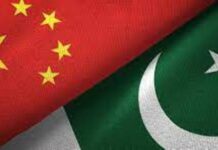Beijing: The book Xi Jinping: The Governance of China Volume III assembles Chinese President Xi Jinping’s 92 speeches and texts between October 18, 2017 and January 13, 2020, preceding the outbreak of the novel coronavirus disease (COVID-19) epidemic. However, the ideas in the book are still relevant.
Several insights attract readers’ attention from the start. At the national level, the goal of realizing rejuvenation of the Chinese nation manifests itself in multiple ways, with the most striking one being the unleashing of the country’s vitality leading to the greatest economic growth in human history. In 2020, this vitality was not subdued by the pandemic, but on the contrary, remained strong.
Despite the still uncertain global economic outlook, the World Bank projected that China’s GDP growth would accelerate to 7.9 percent in 2021. At the same time, the pandemic also reinforces Xi’s assessment that the world is facing changes unseen in a century.
Key to China’s success
In contrast with volatile international situations and the alarming domestic division in the United States, the world’s largest economy, also the representative of Western democracy, China’s incredible feats unfolding before our eyes make people think that it will not be long before the country can successfully realize the Chinese dream of national rejuvenation.
Indeed, anyone who dispassionately observed the crisis in the U.S. Capitol on January 6, where hordes of vandals stormed the building encouraged by then sitting U.S. president himself, against the backdrop of tens of millions of citizens who do not trust the mechanisms of their own democracy, knows that we are witnessing a major change with remarkable potential echo in international politics. The U.S. democracy, seen as a model in the West for two centuries, is cracking dramatically due to internal causes.
In the West, usually politicians trumpet short-term goals to win over voters, while statesmen who think deeply and adopt a long-term approach are hardly recognized and seem to belong to the past. In such a context, it is completely novel to read a 650-page corpus containing the ideas of a country’s leader ruling a fifth of the world’s population and contributing to multilateralism and to global interdependence like no other.
In style and content, Xi’s analysis is based on socialism with Chinese characteristics, sometimes incorporating references to the country’s philosophical wisdom dating back 5,000 years, making it a unique flowing narrative. Also, in times that call for more international cooperation, volume III can help readers from different continents understand Xi’s motivations and the country’s achievements directly, without intermediaries.
How does the leader of a country responsible for a third of the world’s economic growth assess the course of the local and global economy? How does he evaluate the public policy mechanisms of the government that has managed to lift nearly 800 million people out of poverty in the last 40 years? What steps has China taken to achieve the status of a moderately prosperous society?
What are the institutional merits of the country which can explain its successful fight against COVID-19 while most of the world is overwhelmed by the virus? What are the guiding principle and goals of the Belt and Road Initiative? What is the meaning of a community with a shared future for humanity? The answers to these and other fundamental questions are found in the book.
– The Daily Mail-Beijing Review News exchange item




